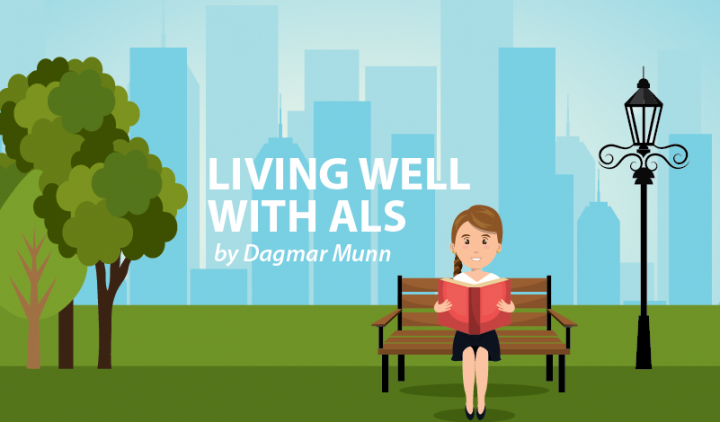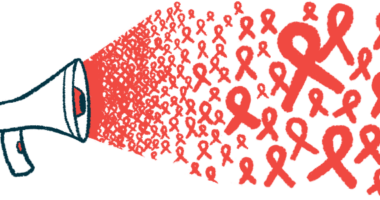What (Not) to Say to a Friend Who Has ALS

Whether I’m at a social gathering or in the middle of a lighthearted chat in the grocery store, there’s no doubt about it — people can say the darndest things! This is particularly true when they’re stymied over what to say to me about my ALS.
Don’t get me wrong. I genuinely appreciate their heartfelt concern and sympathize with the challenge of finding the right thing to say. So, when they fall back to familiar phrases that may work well for other health conditions but not so well for ALS, I let them off the hook.
However, in the spirit of raising ALS awareness and to help friends and family learn what to say and what not to say, I offer the following list and tips:
‘My uncle Albert also had ALS, and he only lasted 4 years’
Although my sympathies go out to your poor uncle Albert, sharing how long he lived is, in my opinion, way too much information.
Plus, it tells me that you don’t understand ALS. From the variety and severity of symptoms to age of onset, each person’s journey with ALS is unique.
So, while I politely listen and smile, my brain is madly working to erase the image of an invisible expiration date being stamped on my forehead.
Solution: I suggest you say, “My Uncle Albert also had ALS … and let me know if I can ever be of help.” This shows me you recognize that having a circle of support contributes to my overall well-being.
‘You are such a hero’
Unless I just raised an astronomical amount of money for ALS, I don’t consider myself a hero.
I didn’t choose to have ALS, to fight the battle, summon the courage, or achieve a seemingly impossible quest. I’m simply a person who decided to be optimistic, show up, and participate while living with ALS.
Solution: Instead, call me a role model for others. I’ll accept being a role model because that was my choice.
‘Send me a news article about the latest ALS discovery or “cure”‘
Not too many years ago, I’d receive newspaper clippings in the mail. Now articles come by email. Since both methods are a form of communication, I’ll include this tip as well.
Please take the time to read what you sent me. Most likely, the news is old, the miracle cure is spam, or it’s for the wrong disease — multiple sclerosis is not the same as ALS.
Know that within 48 hours of my diagnosis, I scoured the entire internet, joined eight ALS Facebook groups, registered in two chat rooms, and signed up for daily emails from ALS News Today.
I’m up to speed on all things ALS.
Solution: I’d rather receive an email from you with news about you, or an upbeat message. Heck, even funny pet photos are welcome. Just keeping in touch with me would be great.
One final tip
We can’t control the things that people say to us, and someone, somewhere, is bound to make a thoughtless remark. Our choice is to either avoid people altogether or learn to cope and offer them a learning experience.
Let’s help our friends and family learn what they can do to help maintain the quality of our lives. Let’s learn to live well while living with ALS.
More helpful suggestions can be found in my column “How to Help Your Friends When They Ask to Help You.”
***
Note: ALS News Today is strictly a news and information website about the disease. It does not provide medical advice, diagnosis, or treatment. This content is not intended to be a substitute for professional medical advice, diagnosis, or treatment. Always seek the advice of your physician or other qualified health provider with any questions you may have regarding a medical condition. Never disregard professional medical advice or delay in seeking it because of something you have read on this website. The opinions expressed in this column are not those of ALS News Today or its parent company, Bionews Services, and are intended to spark discussion about issues pertaining to ALS.







Lynn Campbell
Thank you so much ❤️ for the article on ALS I read all I can, I have a family member who has ALS and it's still hard to accept.
Maria Alicia Muscellini
Tengo ELA ESCLEROSIS BULBAR ME AFECTÓ EL HABLA Y LA DEGLUCIÓN. Ayúdame por favor
Dagmar Munn
Translation: "I HAVE ELA BULBAR SCLEROSIS AFFECTED MY SPEECH AND SWALLOWING. Please help me"
Maria, I am sorry that Bulbar ALS has affected your speech and swallowing. You should be able to receive good help and support from your physician and a speech therapist.
Here are to columns that I wrote about these topics:
http://alsnewstoday.com/2018/07/17/als-hard-act-swallow-tips/
http://alsandwellness.blogspot.com/2018/03/als-dysarthria-use-these-innovative.html
Best wishes to you on your journey with ALS.
Marianne Opilla
Thank you for these helpful tips. Having just been diagnosed in Sept I am struggling with "who needs to know." I am starting to feel that I just want to tell friends (haven't yet) because it feels like a "secret burden" when I am with them. I also feel that friends knowing may be helpful to my husband for support.
Dagmar Munn
Marianne - - this column that I wrote may be of help to you too. It about knowing when it is time to tell friends and family. Best wishes to you.
Marianne Opilla
I don't see the attachment for the column? I would really like to read it! Thank you.
Dagmar Munn
Apologies Marianne - - the link didn't show up in my previous reply :-) Here it is again:
http://alsnewstoday.com/2019/06/04/conquering-gap-diagnosis-knowledge-acceptance-tips/
Marianne Opilla
Thank you! I have read the columns and they are helpful.
Annie
The darnedest thing I ever heard said to my husband, shortly after he was diagnosed (said to him by someone who had lost a brother I’ll law to ALS) , was “ Gee, Greg, life really sucks for you now, doesn’t it?”He had such grace and dignity, responding with”we all must deal with the hand life has dealt us, don’t we?”
Karin Marsden
Hi Dagmar, thank you for this very interesting article.Made me laugh, your so right. The amount of so called well meant comments I get, from people that actually don't have a clue about what ALS/MND is or what it means to live with it is mind blowing. I generally smile, but every so often I can't resist of pointing out that not only have the got the facts wrong, but don't really know what there talking about. Just shows you though how much more awareness needs to be created.
Thanks for all your hard work with this
Susan Smith-Brooks
As a teacher, I decided to educate my friends on Facebook about ALS, so I share the funny stories that happen on this journey. This is a great article, and I’d love to share it with my friends, but I feel it may be taken the wrong way. So I am just going to laugh along with everybody else. My husband made me some little signs indicating I have a ALS, which he laminated for me. I just flash them when I need to. Thank you for all of these small articles, as they are always very uplifting.
David Doane
Dammar, I look at this very differently, it is no one’s fault you got ALS But everyone wants to help. It is their way of dealing with our disease. I never let any comment bother me, but I use that as an opportunity to recruit their help in advocacy, fund raising or creating awareness or to participate in a clinical trial or study. Using this technique you find out very quickly who really cares. I think it is important to remember this disease has significant impact on our friends, the due feel bad and don’t know what to say or do. Remember we are the experts!
Dagmar Munn
David -- kudos to you for using the opportunity to help educate and raise awareness of ALS. Thank you!
Bill
We are all different of course. I don’t think I’ve had anything said to me which bothers me. I know nothing said was meant to trivialize or in any way should bother me. People ask me how I’m doing , even if I’m getting better. I just tell them with no sadness that’s not the way ALS works. People are supportive. I’d rather have them say what they think than worry about saying the wrong thing. My ALS harder to see than big walking issues. I wear something on my hand always either wrist /finger brace or taping of fingers. It’s funny people will notice that and ask if I hurt my fingers/hand/wrist but not notice an atrophied arm. I always just answer honestly that’s its neurological if there’s time I will tell them about ALS. No problem.
Dagmar Munn
Bill, you are doing your part to help raise awareness of ALS -- thank you!
John Russell
I have not felt offended by people telling me they have had personal experience with ALS through family or friends. I feel pleased when someone recognizes me for dealing well with my disability or that my attitude is helpful to them. I do have some trouble with all the well meaning offers of help when I'm struggling but intend to do it myself. I usually say "I've got it but appreciate your offer".
Dagmar Munn
You're doing great John!
Daniel Jordan
My former boss, who I consider more than a casual friend, but not a "best friend for life" was diagnosed with ALS about a year ago. He left the company and the state, so I don't see him face to face. I am trying to find ways to stay in touch, but I am having a hard time knowing what to say.
In they same situation minus ALS, I would likely text him every few weeks and say, "How You Doing" or something similar. However since I know he has ALS, saying" How Are You Doing" doesn't seem appropriate. At least not every time. I do care how he is doing, and would be willing and would want to hear a full report. However, sometimes I just wan't him to be able to share whatever he wants to talk about and not feel like it has to be centered around ALS
I enjoyed the article and it certainly gives me insight of things not to say, but could you give me some meaningful insight of what I can say just to be there as a friend and support emotionally. I can't offer to help physically because I am in another state, and I don't want every conversation centered around ALS (unless that is what he wants and directs). I just wan't to reach out now and then in the most meaningful way possible.
Dagmar Munn
Daniel, It’s great that you want to reach out to your former boss and let him know you are concerned and want to offer support. It's fine to not want to be pushy in asking about asking how he’s doing… I think he'd appreciate knowing you care. However, I can offer you a few suggestions to help make your first note easier to write.
Hi “X”, I’m just checking in to give you a few updates on what’s been happening around here (or to me) plus, see how you’re doing. I hope your summer is going well. (share a few things or updates about yourself or work). How have you been? Did the move go OK and are you adjusting well? I look forward to hearing from you and reconnecting again.
He most likely will really appreciate your note. Trust that he will tell you whatever is comfortable for him to share. Let your correspondence evolve over time. Good luck and thank you for doing this for your friend who is learning to live with ALS.